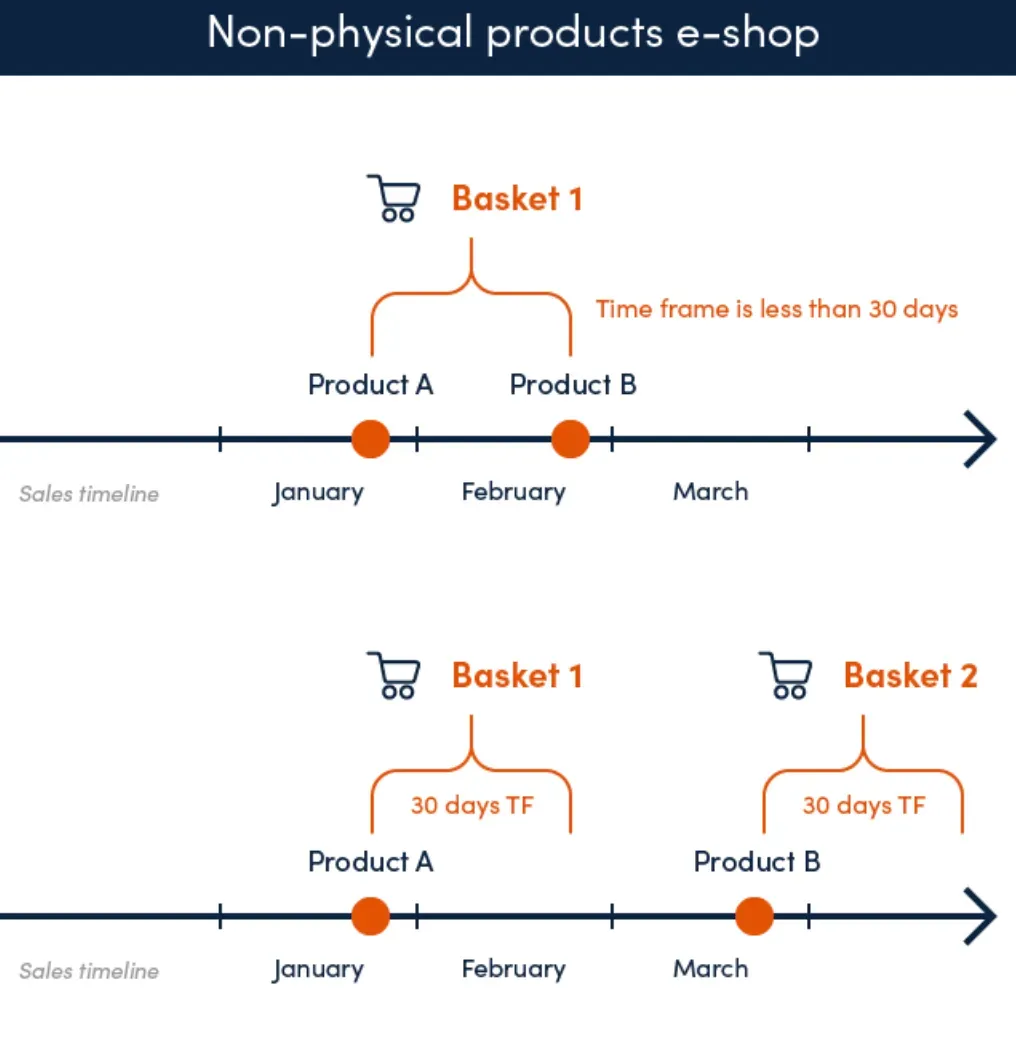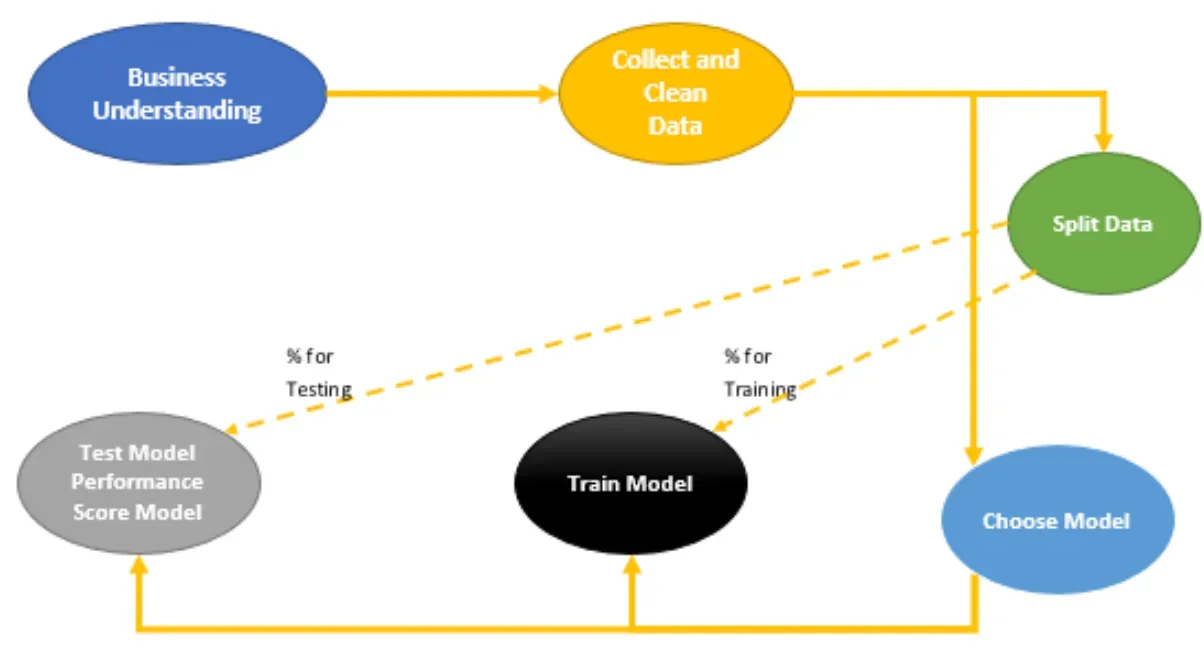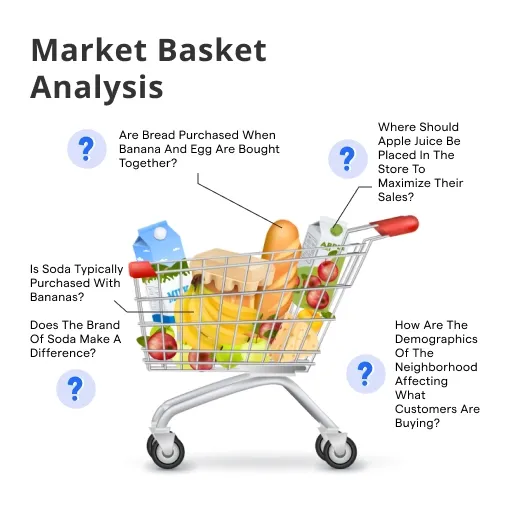What is Market Basket Analysis?
Market basket analysis is a data mining technique used by retailers to discover co-occurrence relationships among activities performed by a specific customer or a set of customers. It involves analyzing large datasets to identify products frequently bought together.
Purpose
The primary purpose of MBA is to help businesses understand customer buying behavior. This insight allows retailers to optimize product placement, promotional strategies, and inventory management.
Scope
The scope of market basket analysis extends beyond the retail sector. It's applicable in e-commerce, finance for fraud detection, healthcare for drug compatibility, and more.
Tools and Techniques
Several tools facilitate market basket analysis, including specialized software like R and Python libraries, SAS, and even Excel for smaller datasets. Techniques often hinge on algorithms such as Apriori, Eclat, and FP-Growth.
Evolution
Market basket analysis has evolved with advancements in technology, from manual calculations to sophisticated algorithms that can process vast amounts of data quickly and efficiently.
Who Uses Market Basket Analysis?
Understanding the primary users of market basket analysis highlights its wide-ranging applications.
Retailers
Retailers are the quintessential users, utilizing MBA to optimize store layouts, promotions, and inventory based on understanding product affinities.
E-Commerce Platforms
Online platforms use MBA to personalize user experiences, recommend products, and increase order value through upselling and cross-selling.
Financial Institutions
Banks and financial institutions deploy market basket analysis for fraud detection, assessing transaction patterns that deviate from the norm.
Healthcare Providers
In healthcare, MBA helps in identifying drug interactions by analyzing prescription patterns, thereby improving patient care.
Telecommunications Industry
Telecom companies use MBA for bundle offers, analyzing call, text, and data usage patterns to craft attractive packages for their customers.
When is Market Basket Analysis Performed?
Market basket analysis isn’t a one-time affair. It plays a crucial role at different junctures.

Regular Business Reviews
MBA is often conducted regularly as part of performance reviews to refine marketing strategies based on the latest customer purchasing trends.
Before Major Campaigns
Before launching major marketing campaigns, analyzing baskets helps tailor the offers to increase conversion rates.
During Store Layout Redesigns
When planning a store layout redesign, MBA informs product placement for cross-selling opportunities.
Seasonally
MBA helps in understanding seasonal buying patterns, allowing for strategic stock adjustments and promotions.
Real-time E-commerce Customization
For online retailers, MBA can be performed in real-time to personalize user experiences, showing relevant product recommendations during browsing.
Where is Market Basket Analysis Applied?
Market basket analysis finds its application in various environments, providing insights that fuel strategic decisions.
In-Store Layout Designing
Understanding product affinities helps in optimizing store layouts, placing complementary products near each other to encourage additional sales.
Online Recommendation Engines
MBA powers the algorithms behind recommendation engines that suggest products based on user's browsing and buying history.
Inventory Management
By identifying which products are often purchased together, retailers can manage inventory more effectively, ensuring those products are well-stocked.
Pricing Strategies
Insights from MBA can inform pricing strategies, such as bundle pricing, discounts on complementary products, and more.
Marketing and Promotions
Market basket analysis helps tailor marketing messages and promotions based on products that are frequently bought together.
How is Market Basket Analysis Conducted?
Let’s walk through the nuts and bolts of performing market basket analysis.

Data Collection
The first step is gathering data, which can come from sales transactions, customer loyalty programs, or online browsing behavior.
Data Preparation
Next, the data is cleaned and prepared, removing any errors or irrelevant data points to ensure accuracy in the analysis.
Choosing the Right Algorithm
Choosing an appropriate algorithm, like Apriori or FP-Growth, is critical based on the dataset's size and complexity.
Analysis and Interpretation
The analysis involves running the chosen algorithm to find frequent item sets and association rules, which are then interpreted to draw actionable insights.
Implementation of Findings
Finally, the insights gained from MBA are implemented in various business strategies including marketing, inventory management, and product development.
Challenges in Market Basket Analysis
While MBA is a powerful tool, it is not without its challenges.
Large Data Volumes
Handling and processing large volumes of data can be resource-intensive and requires robust computational power.
Changing Consumer Behavior
Consumer preferences can change rapidly, making it a challenge to keep the analysis relevant and timely.
Privacy Concerns
With growing scrutiny over data privacy, responsibly handling customer data while performing MBA is paramount.
Identifying False Positives
Not all associations found through MBA are meaningful. Separating useful insights from noise is a skill that comes with experience.
Integration with Business Processes
Translating insights from MBA into actionable business strategies requires seamless integration with existing processes, which can be challenging.
Best Practices for Market Basket Analysis
To maximize the benefits of market basket analysis, consider these best practices.

Continuous Monitoring and Updating
Regularly update your MBA models to reflect the latest consumer purchasing trends and preferences.
Balancing Privacy with Personalization
Always respect customer privacy when using their data, ensuring compliance with regulations like GDPR and CCPA.
Using the Right Tools
Invest in the appropriate tools and technologies that can handle your data volume and complexity.
Combining with Other Data
Enrich MBA insights by combining them with other data sources like demographic information for a more holistic view.
Stakeholder Collaboration
Ensure that insights from MBA are shared across departments to inform strategies in marketing, inventory, and beyond.
Trends in Market Basket Analysis
Staying ahead in market basket analysis means keeping an eye on emerging trends.
AI and Machine Learning Integration
The integration of AI and machine learning is making MBA more powerful and efficient, offering predictive insights beyond simple association rules.
Real-Time Analysis
Advancements in technology are making it possible to perform market basket analysis in real time, offering instant recommendations to online shoppers.
Enhanced Privacy Protection
As privacy concerns grow, new techniques that protect customer data while still allowing for meaningful analysis are emerging.
Cross-Channel Analysis
Analyzing data across multiple channels, from in-store to online shopping, provides a more comprehensive view of customer behavior.
Personalization at Scale
Market basket analysis is becoming more sophisticated, allowing for hyper-personalization in marketing campaigns and product recommendations.
Market basket analysis stands as a testament to how data when correctly interpreted, can illuminate pathways to improved business strategies. Its applications, while traditionally rooted in retail, stretch across industries, offering insights that drive better customer experiences and business outcomes.
As technology advances, so too will the capabilities of the MBA, ensuring its place as a critical tool in the arsenal of data-driven decision-making.
Frequently Asked Questions (FAQs)
What's the impact of Market Basket Analysis on Inventory Management?
Market Basket Analysis can optimize inventory by highlighting product affinities, and ensuring related items are stocked in complementary quantities.
How can retailers leverage Market Basket Analysis for Layout Optimization?
By analyzing product combinations commonly purchased together, retailers can design store layouts that facilitate cross-selling and upselling.
Does Market Basket Analysis consider time-series data?
While primarily transaction-focused, incorporating time-series data can reveal temporal trends in purchasing behavior, aiding in seasonal planning.
How does Market Basket Analysis affect Customer Loyalty Programs?
Understanding product relationships enables personalized promotions, enhancing loyalty programs' effectiveness by offering tailored rewards.
Can Market Basket Analysis drive online recommendation engines?
Absolutely, recommendation engines use market basket insights to suggest items that increase the likelihood of additional purchases by online shoppers.

